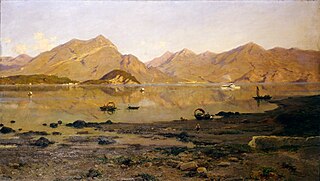Related Research Articles

Lagos, or Lagos City, is a large metropolitan city in southwest Nigeria. With an upper population estimated above 21 million dwellers, it is the largest city in Nigeria, and the most populous urban area on the African continent. Lagos was the national capital of Nigeria until the government's December 1991 decision to move their capital to Abuja in the centre of the country. Lagos is a major African financial centre and is the economic hub of Lagos State and Nigeria at large. The city has a significant influence on commerce, entertainment, technology, education, politics, tourism, art, and fashion in Africa. Lagos is also among the top ten of the world's fastest-growing cities and urban areas. In 2024, Time Out magazine ranked Lagos as the 19th Best City to visit in the World. A megacity, it has the fourth-highest GDP in Africa, and houses one of the largest and busiest seaports on the continent. Due to the large urban population and port traffic volumes, Lagos is classified as a Medium-Port Megacity and the most fast rising city.

Silvio Manfred Dante is a fictional character on the HBO TV series The Sopranos, portrayed by Steven Van Zandt. He is the consigliere and right-hand man to Tony Soprano in the DiMeo crime family. John Magaro portrays a young Silvio Dante in the 2021 prequel film, The Many Saints of Newark.
Bellasi is a Swiss-Italian motorsport company specialized in manufacturing composite parts for racing cars. From 1970 to 1971 it was a Formula One constructor. They participated in six grands prix, entering a total of six cars.
Aarón Galindo Rubio is a Mexican former professional footballer who played as a centre-back.

Val Joe "Rudy" Galindo is an American former competitive figure skater who competed in both single skating and pair skating. As a single skater, he is the 1996 U.S. national champion, 1987 World Junior Champion, and 1996 World Bronze medalist. As a pairs skater, he competed with Kristi Yamaguchi and was the 1988 World Junior Champion and the 1989 and 1990 U.S. National Champion. He is the first openly gay skating champion in the United States, though US, World and Olympic champion Brian Boitano came out long after his career was over.

Mar-a-Lago is a resort and National Historic Landmark in Palm Beach, Florida. It spans 126 rooms and 62,500 sq ft (5,810 m2) built on 17 acres of land. Since 1985, it has been owned by United States president-elect Donald Trump. The estate has been his primary residence since 2019.

Giovanni Comisso was an important Italian writer of the twentieth century, appreciated by Eugenio Montale, Umberto Saba, Gianfranco Contini and many others.
Benjamín Galindo Marentes, nicknamed El Maestro, is a Mexican former professional footballer who played as a midfielder. He participated with the national team in the 1994 FIFA World Cup.

Lake Cuitzeo is a lake in the central part of Mexico, in the state of Michoacán. It has an area of 300–400 km2 (120–150 sq mi). The lake is astatic, meaning the volume and level of water in the lake fluctuates frequently. It is the second-largest freshwater lake in Mexico.

Waterhouse's leaf-nosed bat is a species of big-eared bat in the family Phyllostomidae. It is found in the Greater Antilles in the Cayman Islands, Cuba, Hispaniola and Jamaica, as well as Mexico south to Guatemala.
Autonomists for Europe was a minor regionalist, Christian-democratic and liberal Italian political party. Founded in 2000 by splinters of Northern League as a potentially dangerous competitor, it became a rather marginal force.

The Brazil men's national water polo team represents Brazil in international men's water polo competitions and friendly matches.
Galindo may refer to:
The Torneo Plácido Galindo was a knockout competition played by 42 football teams.

Silvio Poma was an Italian painter, who mainly painting land and lake-side seascapes of the Lombardy lake district.
Galindo is a neighborhood in Austin, Texas. The area covers part of ZIP code 78704 in south Austin.
Giovan Battista Lelli was an Italian painter.
Honrarás a los tuyos is a Mexican telenovela produced by Guillermo Diazayas for Televisa in 1979.
References
- ↑ "Perfil: Dip. Silvio Lagos Galindo, LXI Legislatura". Sistema de Información Legislativa (SIL). SEGOB . Retrieved 14 July 2024.